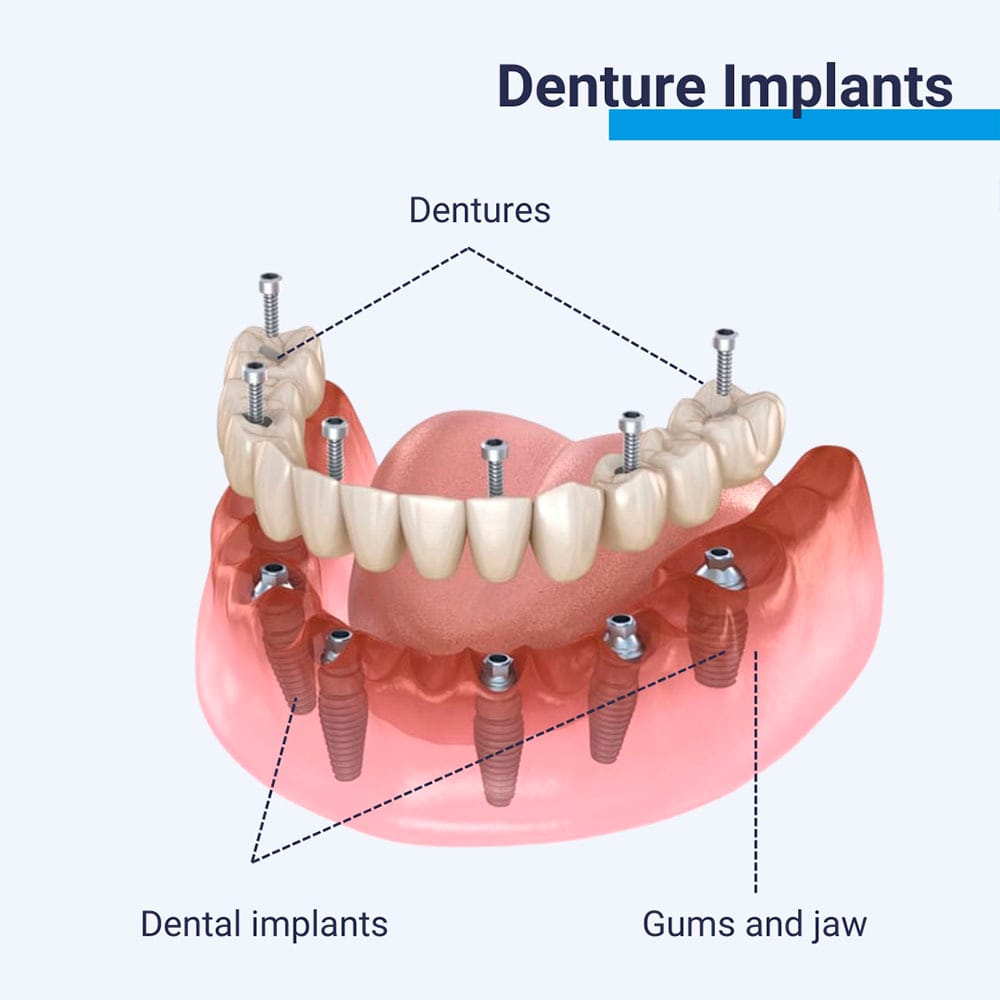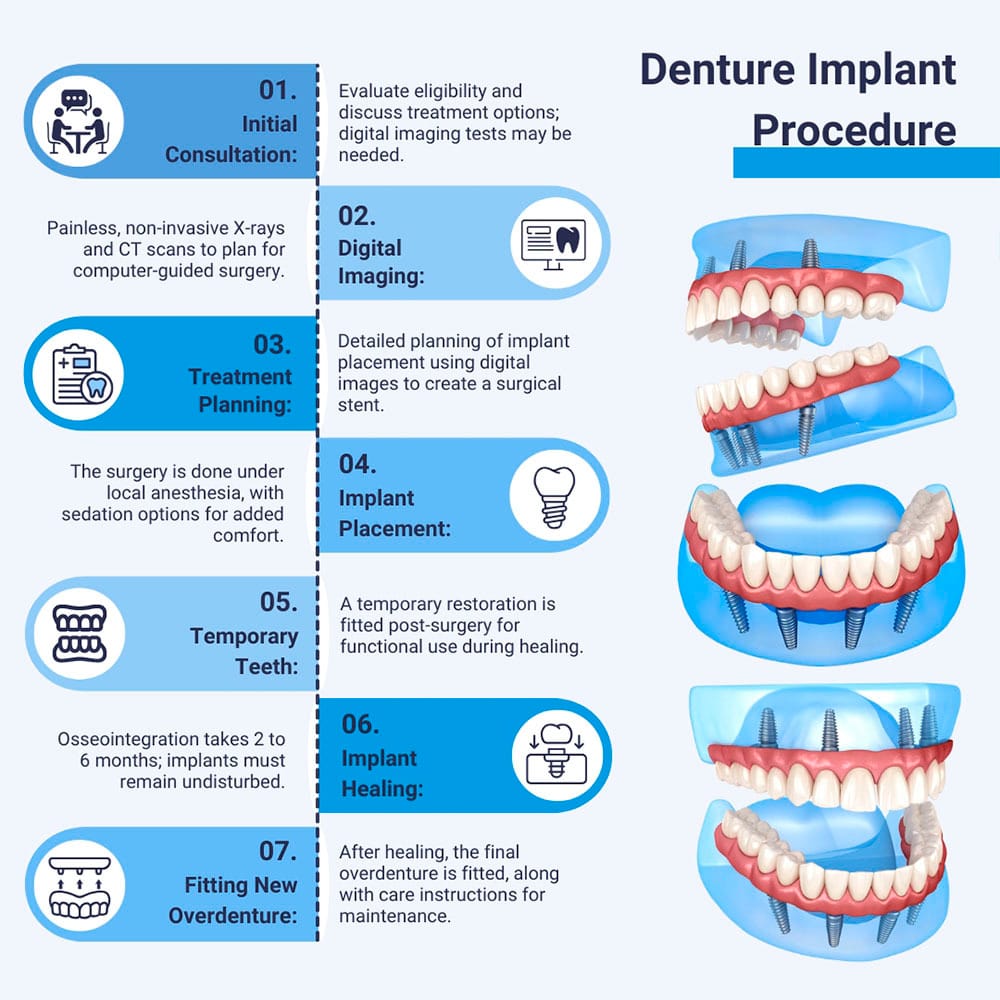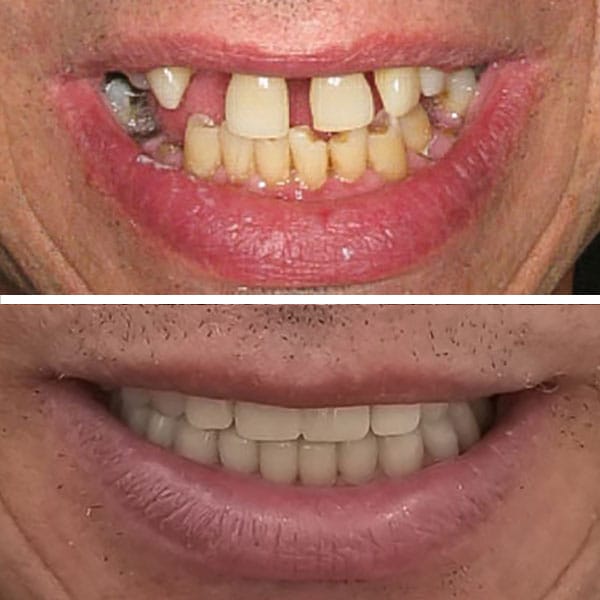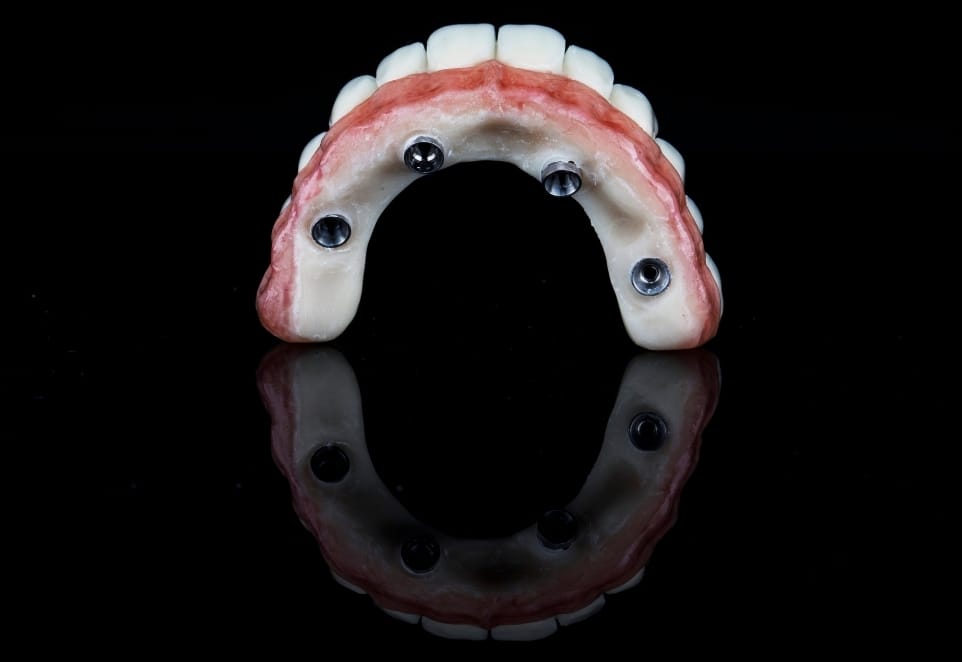
What Are Denture Implants?
Dental implants are small screws or posts that are surgically inserted into your jawbone, where they soon become fused in place and able to support replacement teeth.
While these replacement teeth are sometimes non-removable, denture implants are a hybrid solution. They combine the latest implant technology with removable dentures that are easy to maintain and cost-effective.
How Do Denture Implants Work?
With denture implants, your denture has special attachments on its fitting surface that clip onto the implants in your jaw. Sometimes, a bar is fitted onto the implants, and the denture is designed to clip onto the bar.
The result is teeth held firmly in place until you snap out or unclip the denture whenever you wish to clean it.
Denture implants are also called overdentures. An overdenture can provide teeth that are stronger, more stable, and more comfortable than traditional dentures. Modern overdentures can have the latest and most natural-looking denture teeth, rejuvenating your appearance.

Why Choose Denture Implants?
There are several reasons why you may wish to choose an implant overdenture, which include:
- Enhanced fit and comfort. An implant overdenture is designed to fit comfortably and securely. Because it clips onto the implants, it cannot move around.
- Improved stability without messy adhesives. You don’t need to use denture adhesives with an implant overdenture. It will provide greater stability and strength than an ordinary denture.
- Restored ability to eat and speak clearly. When your denture teeth are firmly in place, you will find it easier to eat, chew, and speak confidently.
- A long-lasting solution. Dental implants are designed to last for years, if not for life.
- A cost-effective solution for tooth loss. Fewer dental implants are needed to support an overdenture so treatment can be cost-effective.
See Denture Implants Before & After Results

See more photos of Denture Implants before and after
Who Is a Good Candidate for Denture Implants?
Candidacy for denture implants is the same as for any implant treatment. You need to have reasonable medical and dental health.
Ideally, you shouldn’t smoke or be prepared to quit during treatment. It doesn’t matter if you are older, and this treatment has helped many seniors overcome the problems associated with tooth loss. Implant overdentures act as stable implants for seniors who wear dentures, providing a secure, long-lasting solution.
Implant overdentures can be a good solution for anybody who has previously investigated dental implants, only to be told they require bone grafting.
Not everyone is suitable or wishes to have a dental bone graft. The techniques used for this procedure can reduce or eliminate the need for bone grafting by inserting the implants toward the front of your jaw. The jawbone tends to be naturally thicker and stronger here.
An implant overdenture is also more cost-effective compared with other implant solutions. Fewer dental implants are needed to support an overdenture, reducing the overall costs compared with a fixed implant solution.
How Many Dental Implants Are Needed for an Implant Denture?
The number of implants for dentures can depend on whether you need an upper or lower arch of teeth replaced.
If you need to replace a lower arch of teeth, you may need as few as four dental implants to hold an overdenture securely in place.
An upper overdenture may require more dental implants to secure it. This is because the upper jawbone is generally weaker and thinner than the lower jawbone, requiring more dental implants for support.
When you visit Clock Tower Dental, we will recommend the number of dental implants we know will provide the best support and stability and an optimal, long-term treatment outcome. At this stage, we can also advise you of the cost of your overdenture.
The Denture Implant Procedure
The process for having dental implants for dentures is similar to all implant procedures. The steps are briefly outlined below.
- Initial Consultation
An initial consultation is needed to determine your eligibility, and so we can explain more about this treatment and show you examples of implant overdentures. If you decide to proceed, we must conduct digital imaging tests.
- Digital Imaging
Digital imaging is completely pain-free and non-invasive. During this process, we take digital dental X-rays and a cone beam CT scan, and we may take digital dental impressions of your mouth. These are used to plan your treatment in preparation for computer-guided surgery.
- Treatment Planning
Your treatment is planned thoroughly behind the scenes, so we know exactly what will happen, step by step. Our implant dentist decides where each implant should be placed, using your digital images as a guide.
Once your treatment plan is complete, a surgical stent is computer-generated and is ready for your implant surgery.
- Implant Placement
Dental implant surgery is pain-free as we ensure your mouth is numb before we begin. However, we can provide sedation dentistry to help you feel comfortable and relaxed.
After implant surgery, we will give you detailed information on how to care for your mouth as it heals. We may prescribe antibiotics or an antimicrobial mouthwash to reduce the risk of infection. You will need to eat softer foods that require minimal or no chewing during this time.
- Temporary Teeth
A temporary restoration is made before your surgery and ready to fit soon afterward. You should be able to leave our dental office with a temporary set of teeth in place while your implants heal. Sometimes, we can adapt an existing denture for a temporary restoration.
- Implant Healing
It takes two to six months for dental implants to Osseointegrate or heal fully. During this time, the implants mustn’t come under any stress and mustn’t move.
- Making and Fitting Your New Implant Overdenture
We can make and fit your final implant overdenture when your implants have healed. Once you receive your new implant overdenture, we can go over caring for it again. We will ensure you know how to maintain your dental implants and implant overdenture between regular dental checkups and hygiene appointments. For patients with less bone density or those seeking a less invasive option, we also offer mini dental implants, which provide stability and support for dentures in a minimally invasive procedure.
Are you interested in having teeth that feel stable and strong and look good? Schedule your consultation with Clock Tower Dental. You can discover more about this treatment and learn if an implant overdenture is right for you or if an alternative implant treatment will suit you better.

